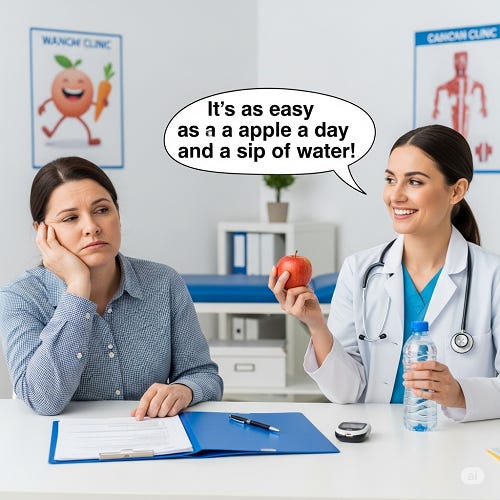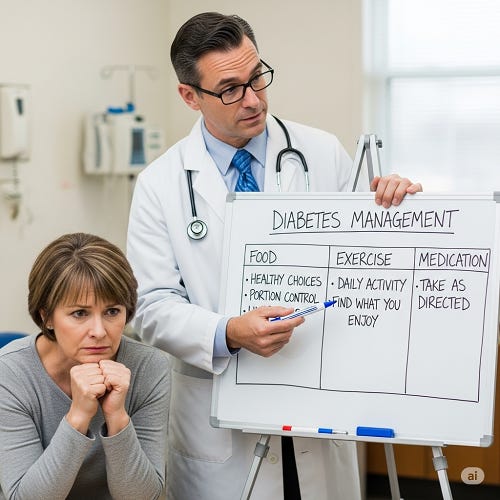Demystifying Science & Medicine Part 1 of 3
Biomedical stuff aside, diabetes is complicated.
Diabetes demands many changes of people, requiring lifestyle, meal plan and scheduling modifications. A study by Elaine Sullivan touches upon the idea of change in patients with diabetes. Because diabetes is self-managed, decisions regarding insulin, diet and exercise must be juggled by the patients themselves. Indeed, those with diabetes are:
...expected to make multiple [complex] changes at the same time...[which] involve understanding the effect of exercise patterns, medications, and dietary intake level on blood glucose. The process is not static; change in one or all of the behaviours may not entirely correct a problem.1
Presuming it’s a “problem” in the fist place that needs to be “corrected.” Doctors and nurses often expect these changes to show an immediately beneficial result, rather than teaching a person to understand the complexity of the physiological changes in their bodies and incorporate these changes into their own decisions regarding self-management and the myriad of possible factors that affect blood glucose (42 at last count.)
Health providers, furthermore “tended to oversimplify diabetes self-management, not recognizing that this task is a very complex and demanding challenge.”2
Easy peasy!
To be fair, health providers are busy and don’t necessarily have the time to spend hours explaining the complexities of diabetes with each patient. But that does not excuse doctors from the requirement to help people learn about their illness. Healthcare professionals speak from a privileged position in a society that sees them as authoritative. Doctors’ orders often trump a patient’s own understanding of his or her condition, even if the patient has been living with diabetes for years.
This may not always be for the best, however, since diabetes is different for everyone, and in many cases it is the individual with diabetes who is most attuned to the physiological effects of the condition. When it comes to treatment, therefore, what works for the individual is the key—the doctor, importantly, doesn’t necessarily have the latest treatment guidelines or your best interests at heart.
With T1D taking insulin isn’t optional. It’s a physiological requirement.
I believe that modern medicine, informed by the scientific method, has to take the back burner to a person with diabetes’ own experience. The restrictions currently imposed on someone with diabetes by doctors can be ridiculous; such doctors tend to act as if diabetes were an acute condition, like a broken arm that can be easily managed and cured. Many medical professionals, sadly, do not deal with the condition on an individual level, and it is left up to the person with diabetes to find suitable ways to treat it properly. That is exactly what happened with the #Wearenotwaiting movement that gave rise to Do-it-yourself “loopers,” who hacked into their insulin pumps to match them up with continuous glucose monitors to create an automatic insulin delivery system (AID).
For more information about the LOOP app, check out:
https://loopkit.github.io/loopdocs/#what-are-my-next-steps
The disclaimer reads:
Please consult with your health care professional regarding your diabetes management.
The Loop app is an open source project used by many, but it is not approved for therapy by any government organization.
You take full responsibility for building and running this system and do so at your own risk.
While this may work for some people with T1D, it takes a bit of a learning curve to understand.
If I demanded that a person without diabetes stop eating anything that contained sugar for the rest of life, he or she would laugh. However, I was told never to eat anything with sugar in it, even though sugars are now considered part of a balanced meal plan for people living with diabetes. So why are there all those people making money off outdated “diabetic” cookbooks? It could be these are the same people who are exploiting the diabetes market by selling so-called “diabetic” chocolate that has sugar in it (and doesn’t taste very good either).
Listen to what the medical team tells you, but it is you who has to make the ultimate decisions. You must take control of your own body. Easier said than done, understandably.
Aldous Huxley said that:
…science is just like a cookery book, with an orthodox theory of cooking that nobody’s allowed to question, and a list of recipes that mustn’t be added to except by special permission from the head cook…3
Conventional medicine has been criticized on many levels.
Rosalind Coward, in her book The Whole Truth: The Myth of Alternative Medicine, argues that conventional medicine:
Endangers health, considering profit more important than people
Treats diseases and symptoms rather than people
Perpetuates inhumanity
Induces unnecessary suffering
Rarely attends to feelings or emotions
Does not allow for patient control over treatment
This is a problem for people with a chronic condition such as diabetes. People are starting to realize that some of the “major events of life—birth, illness, and death—have been horrendously mismanaged in a society where status and profit [predominate].”4
This viewpoint is increasing as people turn to holistic options—alternative medicine, or traditional medicines—and the “wellness” industry, which could also be integrated as “complementary” medicine and become a for-profit enterprise.
Next week, part 2 of the 2 part series Demystifying Science and Medicine!
You should subscribe so you don’t miss the good stuff. You’ll also get access to the archive and so much more!
Sullivan, E. D. (Jan/Feb 1998) “Struggling With Behaviour Changes: A Special Case for Clients With Diabetes,” Diabetes Educator, 24(1), p. 76.
Sullivan, E. D. (Jan/Feb 1998) “Struggling With Behaviour Changes: A Special Case for Clients With Diabetes,” Diabetes Educator, 24(1), p. 76.
Huxley, A. (1982) Brave New World, Grafton Books, p. 224.
Coward, R. (1989) The Whole Truth: The Myth of Alternative Medicine, Faber and Faber, p. 201.




